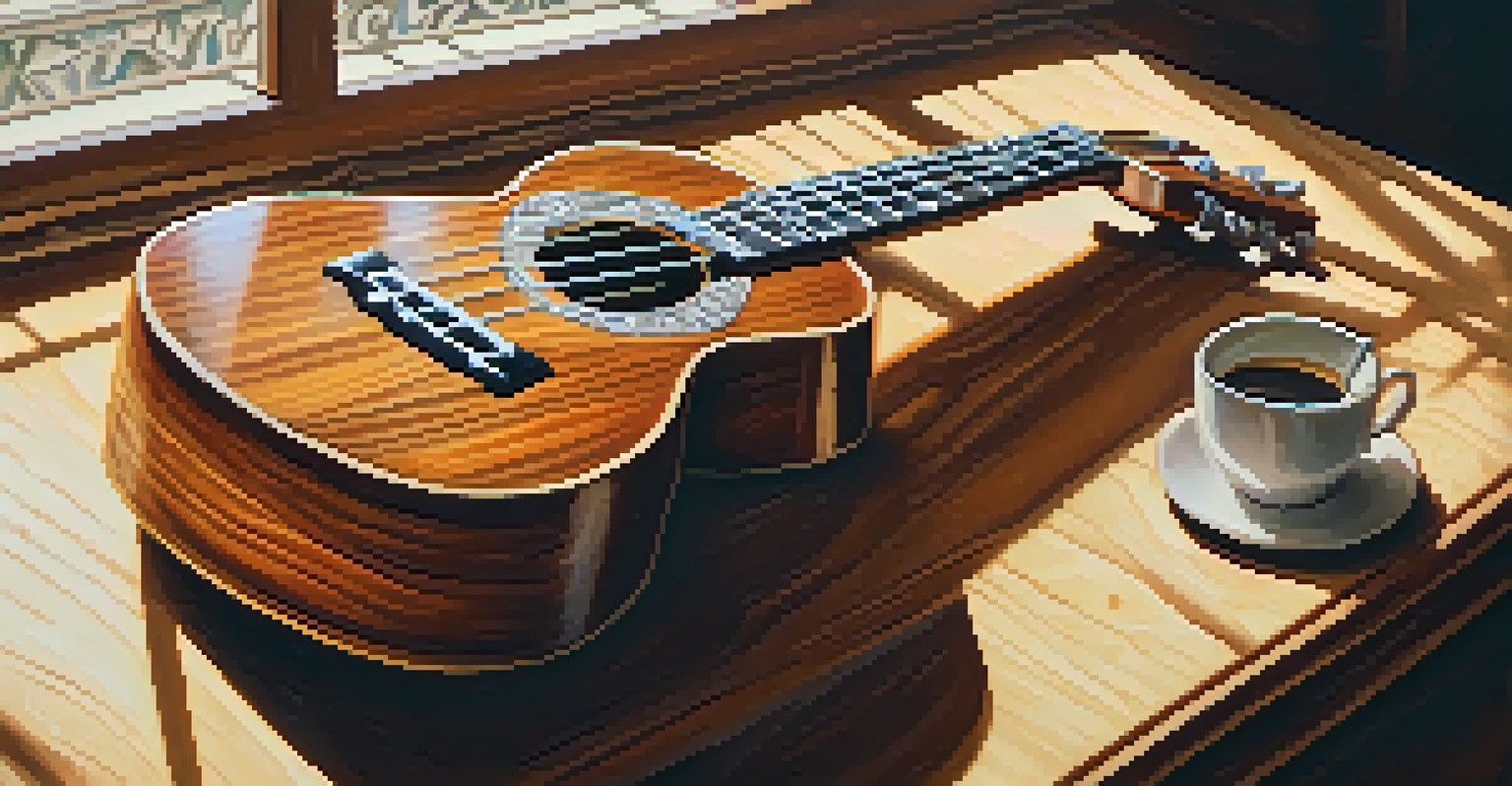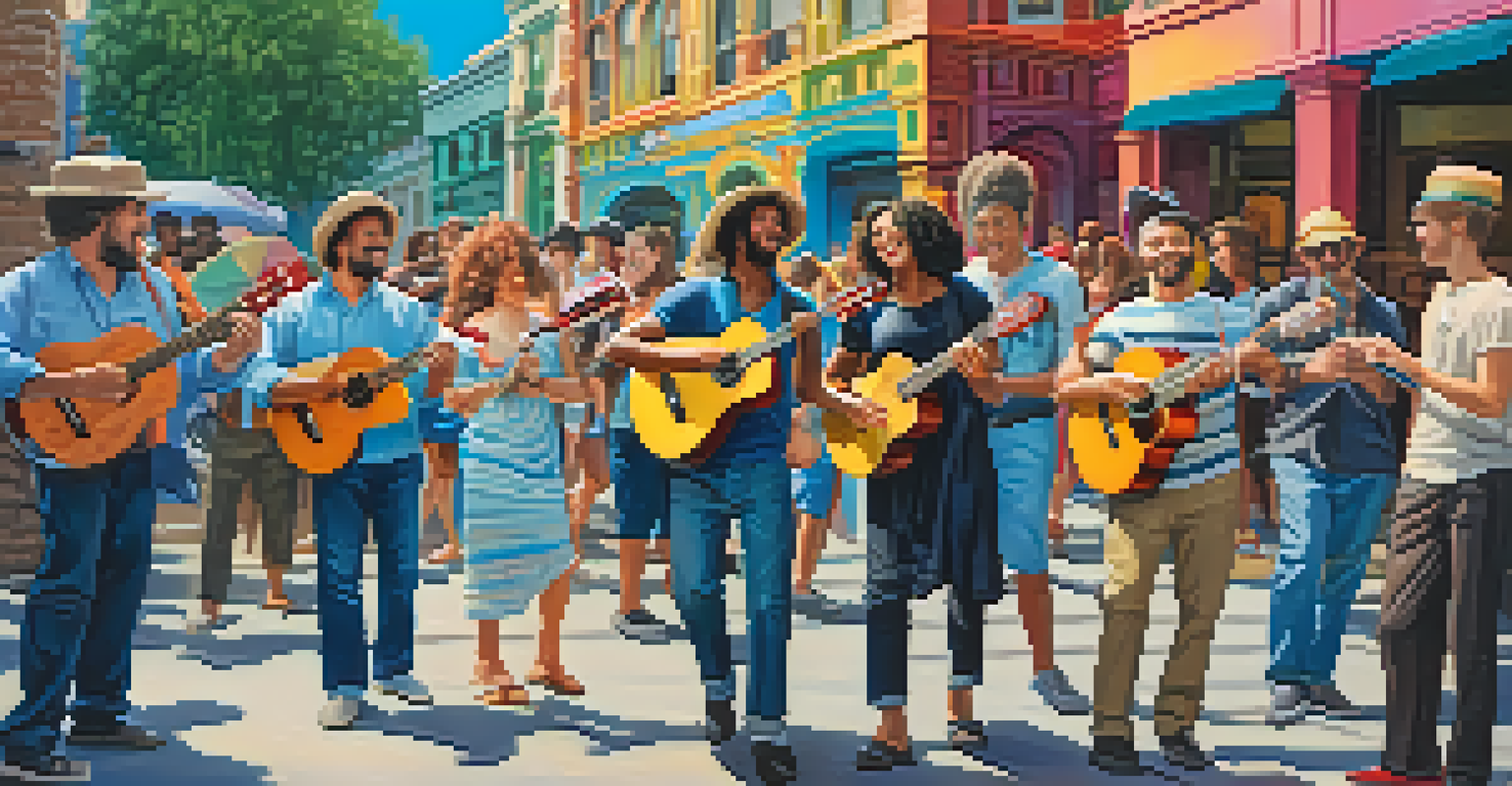From Hawaii to Hollywood: Ukulele's Journey in Film Scores

The Ukulele: A Brief History and Its Hawaiian Roots
The ukulele, a small guitar-like instrument, has its roots in 19th-century Hawaii. It was developed from Portuguese instruments brought to the islands, quickly becoming a symbol of Hawaiian culture. The cheerful, bright sound of the ukulele evokes feelings of paradise, making it a perfect fit for the tropical landscapes of Hawaii.
The ukulele is a symbol of joy and a bridge to community, uniting people through its cheerful melodies.
As the ukulele began to gain popularity, it transcended its local appeal, captivating musicians and audiences worldwide. From traditional Hawaiian music to contemporary genres, its versatility shone through. This adaptability laid the groundwork for its eventual integration into the world of film scores.
The instrument's joyful tone and unique charm caught the attention of filmmakers, leading to its emergence as an element that could evoke specific emotions in their narratives. Thus, the journey of the ukulele began, setting the stage for its eventual Hollywood debut.
Early Cinema: The Ukulele's First Appearances
The ukulele made its first appearances in early cinema, often used to depict Hawaiian culture or tropical settings. Films like 'Hula' (1933) showcased the instrument as part of the soundtrack, bringing a taste of the islands to audiences far and wide. Its lighthearted sound contributed to the escapist nature of these movies.

During this time, the ukulele was primarily associated with novelty acts and light entertainment, creating a specific niche in the film industry. These early portrayals helped solidify the ukulele's identity as a symbol of fun and relaxation. Despite its limited roles, it was a charming addition that resonated with viewers.
Ukulele's Hawaiian Origins
The ukulele originated in 19th-century Hawaii, evolving from Portuguese instruments and becoming a symbol of Hawaiian culture.
As audiences fell in love with the ukulele's sound, this little instrument began to carve out its place in the broader cinematic landscape. The seeds were planted for its evolution, paving the way for more significant roles in future films.
The Golden Age of Hollywood: A Ukulele Renaissance
The Golden Age of Hollywood brought about a renaissance for the ukulele, with its sound becoming a staple in various film genres. Notably, musicals and comedies embraced the instrument, using it to enhance the light-heartedness of their narratives. Movies like 'Blue Hawaii' (1961) featured Elvis Presley strumming the ukulele, solidifying its connection to fun and adventure.
Music has the power to connect us all, regardless of background or experience.
During this era, the ukulele was not just a background instrument but began to take center stage in many performances. Its playful melodies complemented the vibrant visuals, creating memorable moments that audiences cherished. The ukulele's unique sound brought a refreshing energy to the screen, capturing the essence of the carefree spirit of the time.
As filmmakers recognized the ukulele's charm, its popularity surged, leading to memorable compositions and iconic scenes. This marked a turning point in the instrument's journey, as it began to be seen as more than just a novelty but as a serious player in film scoring.
Modern Film: The Ukulele's Versatile Role
In recent years, the ukulele has found its way into a diverse array of film genres, showcasing its versatility. From animated features like 'Lilo & Stitch' (2002) to independent films, the instrument's sound evokes nostalgia and joy. Its ability to convey complex emotions makes it a valuable asset for composers.
Filmmakers often turn to the ukulele for its distinctive sound, which can add warmth and authenticity to a scene. For example, the use of the ukulele in '500 Days of Summer' (2009) created a whimsical atmosphere that perfectly matched the film's tone. This further solidified the instrument's place in contemporary film scoring.
Golden Age of Hollywood Revival
During Hollywood's Golden Age, the ukulele gained prominence in musicals and comedies, establishing itself as a key element in film scoring.
As the music landscape continues to evolve, the ukulele remains a beloved instrument among composers, bridging the gap between different cultures and genres. Its journey from Hawaiian beaches to Hollywood studios illustrates its enduring appeal and adaptability.
Cultural Impact: The Ukulele Beyond Film Scores
The ukulele's influence extends beyond film scores, impacting music and culture in various ways. Its rise in popularity has led to a resurgence of interest in Hawaiian music and culture, inspiring musicians and enthusiasts around the world. This cultural revival has helped preserve the rich history of the instrument while introducing it to new audiences.
Additionally, the ukulele has become a symbol of inclusivity and community, often played in group settings and taught in schools. Its accessibility and ease of learning make it a favorite among beginner musicians. This cultural shift has allowed the instrument to thrive in music education, fostering a new generation of ukulele players.
As it gains recognition in popular music and social media, the ukulele continues to break down barriers, bringing people together through its joyful sound. This cultural impact reinforces the idea that music has the power to connect us all, regardless of background or experience.
The Ukulele's Future in Film and Beyond
Looking ahead, the ukulele's future in film seems bright, with its unique sound continuing to appeal to filmmakers and audiences alike. As new technologies and trends emerge, the instrument's adaptability will likely play a significant role in its continued relevance. From indie films to major blockbusters, the ukulele has the potential to create memorable musical moments.
Moreover, its presence in film can inspire a new wave of musicians and composers, encouraging them to explore its capabilities. As artists experiment with different genres and styles, the ukulele will likely find its way into unexpected sonic landscapes. This innovation can lead to fresh interpretations and exciting collaborations.
Cultural Impact and Future Potential
The ukulele has influenced music and culture globally, promoting inclusivity and community while continuing to evolve in film and beyond.
Ultimately, the ukulele's journey from Hawaii to Hollywood showcases its enduring charm and versatility. As it continues to evolve, this beloved instrument will likely leave a lasting mark on the film industry and beyond.
Conclusion: Celebrating the Ukulele's Journey
The ukulele's journey from its humble Hawaiian origins to the glitz and glamour of Hollywood is a testament to its charm and versatility. Its ability to evoke a wide range of emotions has allowed it to thrive in the world of film scores, captivating audiences for decades. Each strum of the ukulele carries a piece of its rich history, connecting listeners to its cultural roots.
As we celebrate the ukulele's contributions to film and music, it's essential to recognize the way it has brought people together. From casual gatherings to formal performances, the ukulele fosters a sense of community and joy. Its infectious spirit continues to inspire musicians and filmmakers alike.

In the end, the ukulele is more than just an instrument; it represents a journey of cultural exchange and artistic expression. As we look to the future, we can only imagine the new heights this beloved instrument will reach in the world of music and film.